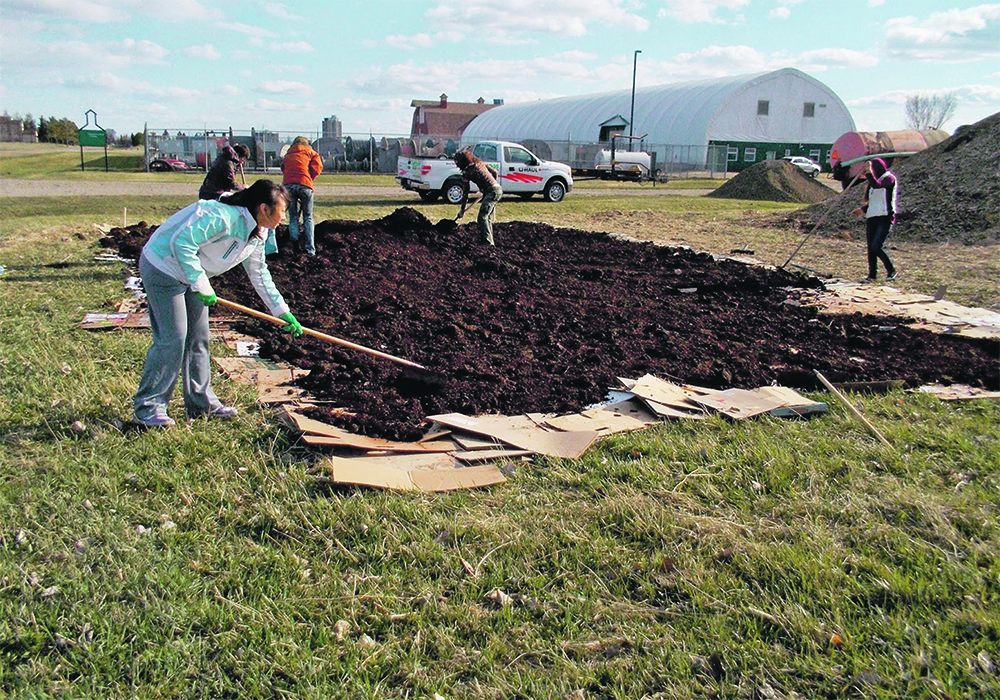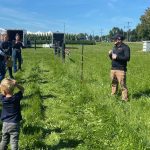Initiative produces fruit and vegetables for community-supported agriculture project and donates to campus food bank
The Prairie Urban Farm, located on a parcel of land at the University of Alberta’s South Campus, is a hub of activity during the short growing season of the northern Prairies.
Run by volunteers, it has produced fresh vegetables, leafy greens and fruit for its subscription community-supported agriculture program and made steady donations to the U of A’s campus food bank, Youth Empowerment and Support Services, and Multicultural Health Brokers.
While PUF has produced an abundance of food since its beginning in 2013, PUF director and professor of environmental sociology Debra Davidson says the main goal of the farm is education.
“One part of increasing food security is to increase basic skills, particularly amongst low income people so that they can do more to not only grow but process and preserve fresh, local produce,” she says.
The city of Edmonton has several urban farms, each with a unique purpose goal.
PUF’s origin story is no less distinctive.
“I was interested in trying to create a space that could lead to an increase in awareness and passion for all things sustainable, food, and agriculture within cities.
“I had no ambitious notion that our little farm was going to be able to make a dent in food security directly… it would be of value to have an opportunity to build skills amongst people who could contribute more to their own food production, and (provide) a better understanding of the economic benefits of relying on whole foods,” says Davidson.

With formal relationships with AdaptAbilities, an organization that helps build employment skills among developmentally challenged individuals, the educational aspect of the farm is carried further.
One of PUF’s lead volunteers is a liaison with AdaptAbilities. Davidson says when he mentors volunteer work sessions, he turns them into learning opportunities.
Multicultural Health Brokers, an organization that aids new immigrant families, has a dedicated plot at PUF for food production that is tended by PUF volunteers, then harvested and distributed among the organization’s clientele.
PUF is also developing an Indigenous garden in which it grows three important medicinal crops for Indigenous people: sage, cedar, and tobacco.
“The cedar doesn’t get harvested, but the sage, we have an elder amongst our volunteer group who manages the sage in particular and will harvest it when it’s ready and prepare it for ceremonial purposes. The same thing with tobacco,” says Davidson.
PUF strives to stay synthetic chemical-free with dedicated crop rotations, diverse plant varieties that are often influenced by volunteer interest, use of green manures, and companion planting.
It also benefits from being located close to the university dairy barn, from which it gets a lot of compost, Davidson says.

It requires a lot of hand labour to produce the amount the farm has produced in past seasons, Davidson says, and the farm relies on a large pool of potential volunteers within the university community.
“That includes mostly students, but also we’ve had a lot of staff and faculty join us as well.”
Through annual spring information sessions and word of mouth, social media and a website, individuals from off campus have discovered PUF and have volunteered as well.
Word of mouth also helped generate interest in the community-supported agriculture box program.
The program started in 2019 as a means to meet the expenses of running the farm.
When news of the new program was circulated, the farm quickly attracted the customers it needed.
“We knew that if we just had anywhere between 12 and 16 box customers, that would more than cover our yearly expenses and within a couple of hours we had enough people express interest…,” Davidsons says.
PUF helps serve as a U of A community outreach tool, and it helps educate people on skills to produce their own food.
Davidson says the farm also helps create a culture of sharing.
“We have a lot of people who share recipes, who come to the farm and bring their own backyard produce to distribute because they know they’ll find people who need it there.”















